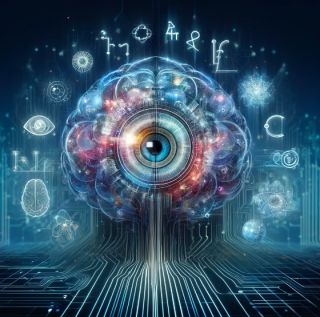Artificial Intelligence
AI's Quest for a Grand Unification Theory
New research helps framing the very nature of intelligence and reality.
Posted May 19, 2024 Reviewed by Tyler Woods
Key points
- AI models may converge towards a unified understanding of reality as they become more advanced.
- This idea, the Platonic Representation Hypothesis, echoes Plato's concept of universal forms.
- The hypothesis has implications for AI's future, reality itself, and the nature of intelligence.

Imagine a future where artificial intelligence (AI) systems, regardless of their specific tasks, all share a common understanding of the world. This is the essence of the "Platonic Representation Hypothesis," a fascinating idea in a recently published paper. The authors suggest that as AI models become more advanced, they start to represent data in increasingly similar ways, hinting at a shared, abstract model of reality. It might be a good idea to put on your thinking cap.
The Platonic Representation Hypothesis: An Overview
The Platonic Representation Hypothesis suggests that as AI models become more sophisticated and are trained on more diverse data, their internal representations of the world will converge toward a unified, abstract model of reality. This shared understanding would transcend the specific tasks or data types the AI models are designed to handle, suggesting a common underlying structure to intelligence and perception.
The Echoes of Plato's Philosophy
The concept of a shared understanding among AI systems is reminiscent of the philosophical idea of platonic ideals. Plato, the ancient Greek philosopher, believed that the world we perceive is merely a reflection of perfect, universal forms. Similarly, the researchers propose that AI models, whether they're processing language, images, or audio, are all tapping into a common understanding of the world as they become more sophisticated—in essence, a unified theory of reality.
Implications for AI's Future
If the Platonic Representation Hypothesis proves true, it could have far-reaching implications for the future of AI. A unified understanding of reality could lead to AI systems that are more efficient and adaptable. Imagine an AI that can easily apply what it learned in one domain, like language, to another domain, like image recognition. This would be a significant step forward from the specialized AI systems we have today.
The Limits of Translation
However, the idea of a shared representation is not without its challenges. Some argue that the apparent convergence might be a result of current technological limitations or biases in the data used to train AI models. Others point out that different types of data, such as images and text, may contain unique information that can't be fully captured by a single, shared representation.
AI's Grand Unification Theory
The pursuit of a unified theory of AI bears a striking resemblance to the quest for a grand unification theory in physics. Just as physicists have long sought to unify the fundamental forces of nature into a single, coherent framework, this theory suggests that the seemingly disparate branches of AI may ultimately converge towards a unified understanding of intelligence and reality. If AI models are indeed tapping into a shared, abstract representation of the world, it suggests that there may be fundamental laws or principles that govern all forms of intelligence, whether artificial or biological. These laws could be as profound and far-reaching as the laws of physics, shaping the very fabric of cognition and perception.
Implications for Reality Itself
The Platonic Representation Hypothesis not only has profound implications for the future of AI but also raises intriguing questions about the nature of reality itself. If AI models are, in fact, converging towards a shared representation of the world, it suggests that there may be an underlying structure or order to reality that is independent of any specific observer or mode of observation. This idea resonates with certain philosophical and scientific concepts, such as the theory of objective reality in metaphysics or the search for a unified field theory in physics.
Bridging the Abstract and the Concrete
If proven true, this hypothesis could bridge the gap between the abstract world of mathematics and computation and the concrete world of physical reality, suggesting a deep connection between the two. It may even hint at the existence of a "platonic realm" of pure forms and ideas that exists beyond our direct experience, but which we can access through reason and abstraction.
While these ideas are highly speculative and require further investigation, they demonstrate the interesting philosophical and scientific implications of the Platonic Representation Hypothesis and its potential to reshape our understanding of both intelligence and reality itself. And while the use of "Plato" in the paper's thesis may be a bit of a linguistic stretch, it offers another avenue of thought to understand AI and perhaps even into the very nature of existence.


